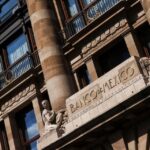
In 2020, the Fed temporarily capped dividends and barred buybacks of the largest banks, citing the need to conserve capital during the pandemic-induced downturn.
Photo: JOSHUA ROBERTS/REUTERS
WASHINGTON—The Federal Reserve said it would test the ability of the largest U.S. banks to weather a hypothetical recession in which markets deteriorate markedly and unemployment jumps above 10%.
The so-called stress test, conducted annually to see how banks would react to drastic market and economic shocks, will feature a scenario in which a severe global recession leads to “heightened stress” in commercial real estate and corporate debt markets, the Fed said.
In a “severely adverse” scenario, U.S. unemployment rises nearly 6 percentage points to a peak of 10% in the third quarter of next year, the Fed said. The large increase in the unemployment rate is accompanied by a 40% decline in commercial real-estate prices, widening corporate bond spreads, and a collapse in asset prices, including increased market volatility.
Designed to gauge the health of the nation’s banking system, the stress tests assess whether a bank has sufficient capital to withstand a severe downtown and to make four quarters of planned shareholder dividends. If a bank misses that target, it faces automatic restrictions on dividends and buybacks unless it raises additional capital.
The biggest banks in the U.S.—a group that includes JPMorgan Chase & Co. and Goldman Sachs Group Inc. —must do well on the tests to return money to shareholders. The banks have done well on the tests in recent years, though in 2020 the Fed temporarily capped dividends and barred buybacks, citing the need to conserve capital during the coronavirus-induced downturn.
Write to Andrew Ackerman at andrew.ackerman@wsj.com
Copyright ©2022 Dow Jones & Company, Inc. All Rights Reserved. 87990cbe856818d5eddac44c7b1cdeb8






